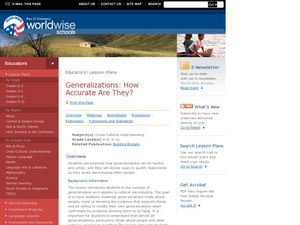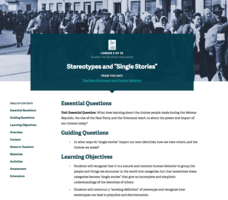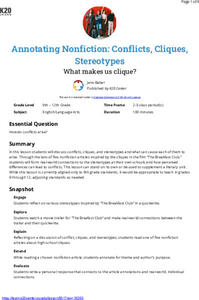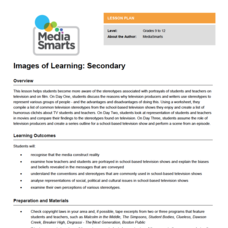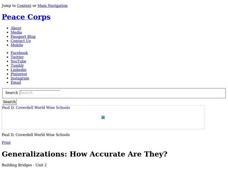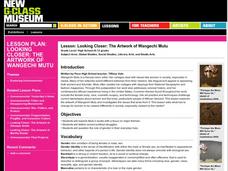Curated OER
Modern Minstrelsy: Exploring Racist Stereotypes in Literature and Life
Satires may be designed to expose a bias to ridicule but if misunderstood can they reinforce that bias? Langston Hughes poem, “Minstrel Man” opens a discussion of racist stereotypes, the minstrel tradition, and the musical, “The...
Curated OER
Generalizations: How Accurate Are they?
Work together to evaluate the accuracy of generalizations. Examine the effects of cultural stereotyping based on generalizations. Students will engage in a class discussion aimed at answering the question, "What are some ways we can...
Curated OER
Reading For Meaning
Select an article that explores people of another culture. After reading it as a class, distribute copies of this worksheet. It asks for a brief summary, encourages readers to make text-to-self connections, and asks learners to identify...
Curated OER
Foreshadowing and Prediction: W.W. Jacob's, "The Monkey's Paw"
W.W. Jacobs' story "The Monkey's Paw" provides plenty of foreshadowing which readers use to make predictions in this tightly composed, sound instructional plan. Your class reads the story, recording predictions and checking for veracity...
Curated OER
Sex Stereotypes in Society
Students analyze a collection of advertisements or photographs in a text or magazine and identify the stereotypes used or possible biases of the editors. They discuss how these stereotypes are formed, and the ways in which they impact...
Facing History and Ourselves
Stereotypes and “Single Stories”
Help bring subconscious stereotypes to the surface to stop it in its tracks. Pupils first read an excerpt describing the experience of prejudice and analyze how this process connects to World War II. Then, they write a creative story...
Anti-Defamation League
Identity-Based Bullying
What is identity? What is bullying? What is identity-based bullying? After discussing these questions as a class, pupils engage in partner discussions before participating in a small group activity to act out bullying scenarios. Then,...
Curated OER
In 'Other words' Writing Gently Humorous Essays About Stereotypes
Define and understand what stereotypes are by reading an article with stereotyping in it. Students will locate how it shows stereotyping and answer questions about the stereotypes. Finally, they will write their own pieces of original work.
K20 LEARN
Annotating Nonfiction - Conflicts, Cliques, Stereotypes: What Makes Us Clique?
John Hughes' The Breakfast Club takes center stage in a lesson about annotating nonfiction texts to keep track of evidence that may be used later in discussions and writings. Scholars consider the stereotypes and conflicts presented in...
Crafting Freedom
F.E.W. Harper: Uplifted from the Shadows
Young historians discover the life of an incredible African American woman who, as an anti-slavery lecturer prior to the Civil War, defied stereotypes of what women could accomplish. Pupils explore the concept of stereotyping, read...
Media Smarts
Images of Learning: Secondary
Make your scholars more aware of stereotypical portrayals in film and television. Discuss the definition of "stereotypes" and how they are used to present a story. High schoolers look at specific television shows and complete a chart...
Anti-Defamation League
Sneakers and Prejudice: Letters to Challenge Bias
After learning that NBA player Stephen Curry's shoes only come in boys' sizes, Riley wrote a letter sharing her concern, highlighting the gender bias and inviting Curry to take action. Scholars view a news clip, review the letters,...
Facing History and Ourselves
Why Little Things Are Big
Often our decisions are impacted by a fear of how others see us. That's the big idea in a two-day lesson that asks how false assumptions, how our fear of how others may see us, impact how we act. After watching a video about such a...
National Endowment for the Humanities
Harriet Jacobs and Elizabeth Keckly: The Material and Emotional Realities of Childhood in Slavery
Young historians learn how to make generalizations based on primary sources in a instructional activity that uses the autobiographies of two women born into slavery. The class watches a historical re-enactment of scenes from the lives of...
Curated OER
Generalizations: How Accurate Are They?
High schoolers recognize and modify generalizations. They challenge generalizations made about people, insist on knowing the evidence that supports these, and be willing to modify their own generalizations when confronted by evidence...
Curated OER
Flying Freudian Fun: A Look At Ethical Decision Making
There are not many more apt examples of ethics gone awry than William Golding's Lord of the Flies.. Ninth graders focus the ethics of decision making with the examples provided in the plot. They focus on the concept of the psyche and how...
Curated OER
Stereotypes and Cross-Cultural Understanding
Learners are introduced to the topic of stereotypes. After reading an article, they complete a chart filling out the appropriate sections. They participate in a class discussion about how to eliminate as many stereotypes as they are...
Curated OER
Generalizations: How Accurate Are They?
Students examine how generalizations can be hurtful and unfair. They devise ways to qualify statements so they avoid stereotyping other people and recognize and modify generalizations. They think about generalizations and stereotypes...
Curated OER
Reading for Meaning
Students answer questions to a worksheet called Connect with Cultural Connections in order to read for meaning. In this read for meaning lesson plan, students read and answer 5 comprehension questions.
Curated OER
Guidelines for Recognizing Persuasiveness, Propaganda, and Stereotypes
Young scholars investigate advertisements for examples of persuasiveness, propaganda, and stereotypes. In this persuasion lesson, students find examples of advertisements that are unusual or common. Young scholars discuss guidelines...
Curated OER
Biases, Assumptions, and Stereotypes
Students examine stereotypes and how to identify their own assumptions. In this bias and assumption instructional activity students read a story and complete a worksheet.
Curated OER
Problem Solving and Decision Making
Help your teenagers learn to plan ahead before making a decision. With hypothetical examples and an online format, this could be a good addition to a language arts, teen issues, or health class. The format itself is not very...
Curated OER
Lesson: Looking Closer: The Artwork of Wangechi Mutu
Social issues of gender and media stereotypes, begins with a multi-sensory experience. Learners view the painting Backlash Blues and make critical comments based on what they see. They then read the Langston Hughes poem and listen to the...
Anti-Defamation League
Mo’Ne Davis and Gender Stereotypes
A thoughtful discussion begins a lesson plan about sports and gender stereotypes. After defining stereotypes, scholars highlight how gender stereotypes often have adverse effects. To break through those stereotypes, the class gets to...



